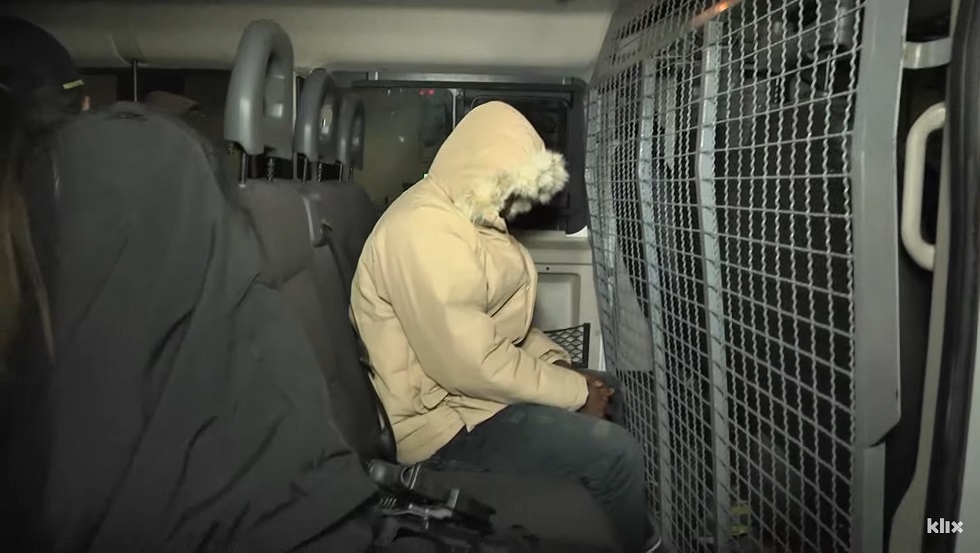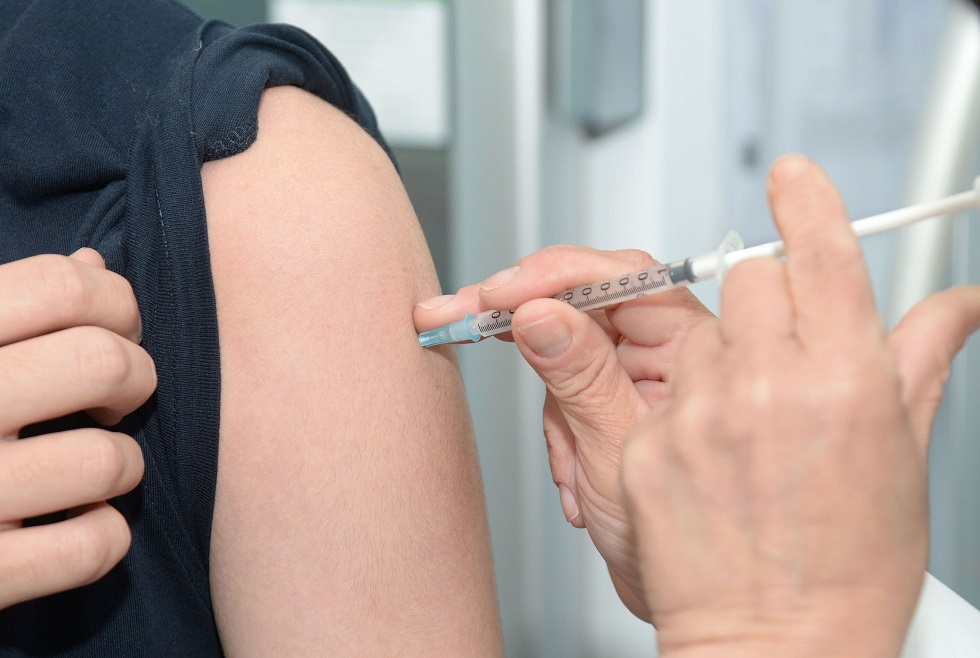Croatia Expecting Boost in Arrivals for Christmas and New Year Holidays
December 17, 2019 - Croatia should see a 4 percent increase in tourist traffic over the upcoming holidays compared to last year.
According to a survey conducted by the Croatian National Tourist Board in conjunction with the system of tourist boards, during the Christmas and New Year holidays, that is, from December 20, 2019, to January 6, 2020, around 227,000 arrivals and 594,000 are expected across the whole of Croatia, which represents an estimated 4 percent increase in tourist traffic compared to the same period last year, the Croatian National Tourist Board (HTZ) said.
“Croatian and foreign tourists are increasingly recognizing and praising the quality offer of Croatian destinations in the winter, both on the continent and on the coast, but also on the islands. This is precisely the right direction in trying to position Croatia as a destination with an attractive and diverse offer throughout the year, i.e., an evener distribution of tourist traffic throughout the year,” said the director of the Croatian National Tourist Board, Kristjan Staničić.
Looking at the announcements of tourist traffic in the counties along the Adriatic, the coast during the Christmas and New Year holidays expects about 126,000 arrivals and 383,000 overnights, which is an increase in traffic of about 2 percent, while the continent expects around 100,000 arrivals and 211,000 overnights, which represents tourist growth of about 6 percent.
The most significant tourist traffic on the coast is expected in Istria, Primorje-Gorski Kotar, Split-Dalmatia and Dubrovnik-Neretva counties, while in continental Croatia, the highest tourist traffic is expected in the city of Zagreb, and Krapina-Zagorje, Međimurje and Karlovac counties, according to the Croatian National Tourist Board.
Recall, Zagreb Advent will run until January 7, 2020, while those on the coast, like Advent in Split, will only run until January 2, 2020.
To read more about travel in Croatia, follow TCN’s dedicated page.
Croatian Radio Television Editor: HRT Needs Funding for Better Programs!
“If everyone paid 96 HRK (12,90 EUR) a month to HRT (Croatian Radio Television), we could perform miracles.” It’s not that ideas are lacking, or that people aren’t creative,” according HRT’s Editor-in-Chief, but HRT is not receiving adequate funding.
HRT, the main public broadcasting service in Croatia, is funded mostly through a compulsory monthly subscription fee of 80 HRK (10,75 EUR).
Program Council Postponing Presidential Election to 2020
On Monday, the HRT Program Council postponed the election of a president until their next session, which is scheduled for January 27. They also discussed Croatian Radio Television's production program for 2020, without providing a positive appraisal of that program, according to Telegram/HINA on December 16, 2019.
The election for the President of the Program Council was postponed after council members failed to elect a president during the four election rounds at the last session in mid-November. None of the candidates had achieved the required six vote majority.
The program council currently consists of nine members, although eleven are legally mandated. On Monday they also discussed the public service broadcasting program for the upcoming year. However, only five members gave the proposed program a "positive assessment” and included their recommendations in the Program Council's comments, while three members abstained.
Croatian Radio Television 2020 Program Still Under Review
HRT's program for next year was presented by the public service broadcasters, who emphasized that the monitoring of Croatia's EU Council Presidency, the European Capital of Culture in Rijeka, the EURO and the Olympic Games in Tokyo are among most important upcoming projects in 2020.
During the discussion regarding the upcoming planned Croatian Radio Television output and the implementation of contractual programming commitments; the members of the Program Council made several comments, most notably about the informative programs, the procurement and selection of content from external productions and the output of local HRT stations.
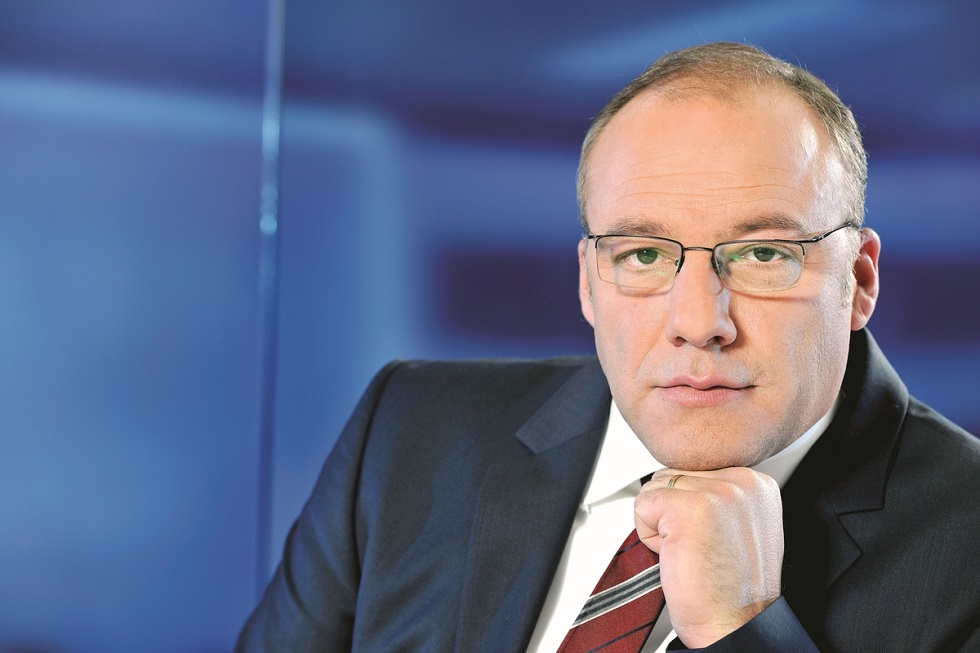
Stipe Alfier | HRT
Did Not Report Zagreb Advent Misconduct and Presidents’ Bus Accident
Recently elected HRT Program Council member Stipe Alfier sharply criticized HRT’s public service broadcasting and cited the recent avoidance of major news topics in news programs - including the alleged misconduct of the Zagreb Advent Organization and the failure to report a bus accident during Kolinda Grabar Kitarovic’s presidential campaign.
Katarina Periša Čakarun, the head of HTV's Information Media Services (IMS) department, dismissed Alfier's allegations regarding HRT’s avoidance of these topics. Bruno Kovačević, editor-in-chief for all HTV television programs, emphasized that there was room for further improvement in HRT programming in accordance with their obligations, and the agreement between HRT and the Croatian government.
Need to Raise Monthly Fee for Better Programming
"We could produce much better programming. It’s not that ideas are lacking, or that people aren’t creative. Don’t forget that our fee has been 80 HRK (10,75 EUR) a month for the last nine years. It should be 96 HRK (13 EUR). According to our calculations, 96 HRK would amount to 1.5 percent of the average net salary in Croatia (6,418 HRK or 862,11 EUR). We could perform miracles with that 16 HRK difference,” Kovačević declared.
Note that the well-known UK-Based public broadcaster BBC has a similar compulsory monthly fee, which is currently 15,26 EUR and only 4,5 EUR more than the HRT fee. According to recent statistics, the average UK monthly net salary is 2907 EUR, which means that the BBC monthly fee for UK residents is on average only 0.525 percent of their monthly take-home income!
In addition to discussing programming, the HRT Program Council members also created a list of candidates for the Commissioner for HRT Consumers position after a public call for applications. Ten applications have been submitted.
Compulsory Monthly Fee Under Increased Scrutiny
The compulsory monthly HRT subscription fee has recently come under increased scrutiny. Up until 2015, HRT inspectors could enter private homes and businesses to verify that occupants owned receivers, which are defined as any device that can receive an HRT television or radio broadcast. If the inspector verified that the home owner, resident, tenant or business owner owned a receiver, they were required to pay the HRT monthly subscription fee.
The inspectors also had the authority to assign the compulsory 80 HRK fee, even if no one answered the door for this inspection, which is no longer the case. If certain conditions are met, a resident can submit a written request to be exempted from paying the monthly fee. Those conditions include: not owning a receiver, moving into assisted living or a nursing home and death. All three conditions require written statements and supporting documents. More information and an application can be found here.
According to Luka Filipović/tportal on December 16, 2019 – HRT representatives have confirmed the recent court ruling that an authorized HRT inspector is not allowed to enter a home or apartment unless the occupant provides consent.
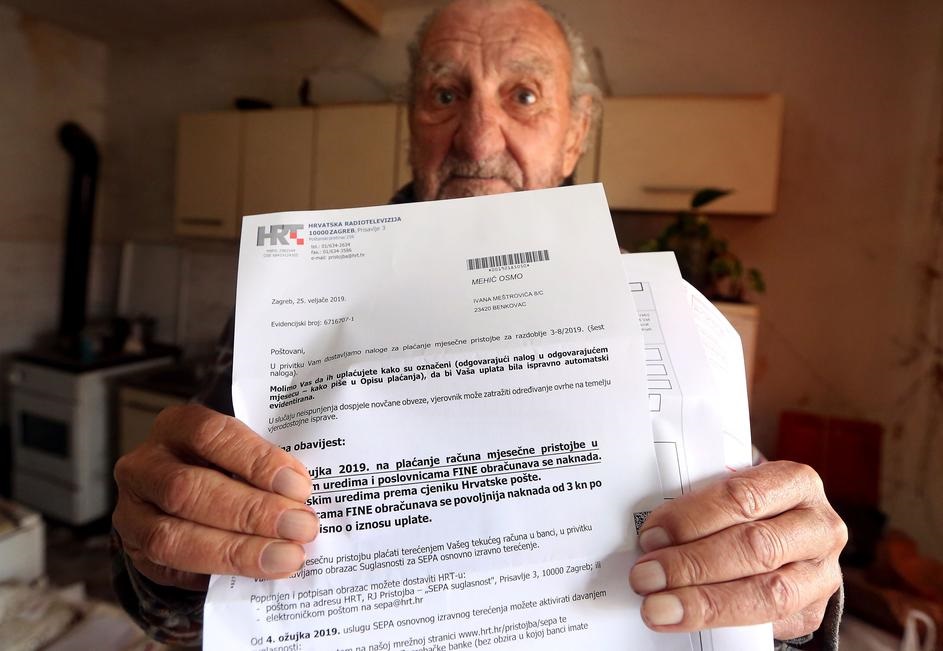
Ukinimo HRT Pristojbu | Facebook
Croatian Radio Television Inspectors Can't Enter Without Consent
"The authorized HRT inspectors do not have a court order to enter a home or apartment. When performing field inspections, they are obliged to furnish their official HRT identification. They can perform an inspection only in the event of a residents' consent. That inspection involves entering an apartment and making a record of established facts," Croatian Radio Television explained.
HRT reports payment inspections for a specific area to local police stations and informs them of the authorized HRT inspectors who will be conducting those inspections. "If citizens call the police during the surveillance procedure, the police will not respond because the the inspector's activities have already been reported to the local police stations," HRT emphasized.
Citizens Should Contact Police Regarding HRT Inspector Misconduct
A representative for the Croatian police emphasized that citizens are encouraged to request a police intervention by dialing 192 if they believe that their rights have been violated or have been subject to unlawful behavior. "A police report is submitted immediately, and officers will go to the scene to collect relevant information and analyze the event," a MUP representative explained.
Follow our Lifestyle page for updates on HRT programming and changes to the compulsory monthly fee.
Zagreb Average Monthly Net Salary Reaches 1005 EUR After Taxes
The average monthly net salary in Zagreb is at 7,487 HRK (1005,71 EUR) and above 10,000 HRK (1342,28 EUR) in some sectors. In September, the highest Zagreb average net salary was recorded in the field of crude oil and natural gas extraction.
Average Net Monthly Salary 1005 EUR
The average monthly net salary for Zagreb employees reached 7,487 HRK in September, which is 0.31 percent higher than August and 4 percent higher than September of last year, according to the latest statistics from the Office for Strategic Planning and Development in Zagreb.
The average salary in September increased by 23 HRK (3,09 EUR) from August and by 288 HRK (38,69 EUR) from September of last year, according to Poslovni Dnevnik/Hina on December 17, 2019.
Zagreb Salaries 144 EUR Higher than Croatian Average
Compared to the average monthly salary for September for the rest of Croatia, which amounted to 6,418 HRK (862,11 EUR) – the average Zagreb monthly net salary for September is 1,069 HRK (143,60 EUR) higher.
According to recent statistics, the average Zagreb net salary for September in the economic sector was HRK 7,289 (979,11 EUR) and 7,883 HRK (1058,90 EUR) in non-economic sectors.
The highest recorded September average net salary reached 12,412 HRK (1667,27 EUR) for crude oil and natural gas extraction. That was followed 10,894 HRK (1463,37 EUR) for financial services, except for insurance and pension funds.

Paweł Czerwiński | Unsplash
Pharmaceutical, Computer, Marketing and Petroleum Industries Over 1340 EUR
Zagreb statistics registered net salaries in excess of 10,000 HRK in the manufacture of basic pharmaceutical products and preparations (10,527 HRK), computer programming, consulting and related activities (10,473 HRK); the manufacture of computers, electronic and optical products (10,423 HRK); publicity and market research (10,208 HRK), and coke and refined petroleum products production (10,173 HRK).
Under 672 EUR in Manufacturing, Food and Beverage and Maintenance
By contrast, the city of Zagreb documented the lowest average September monthly net salary of 4,291 HRK (576,40 EUR) in the sector of apparel manufacture.
Zagreb statistics recorded an average net salary of less than HRK 5,000 in the following sectors. Metal manufacturing salaries averaged 4,432 HRK and textile/leather manufacture salaried were similar at 4,520 HRK. Monthly earnings for food and beverage industry employees amounted to 4,485 HRK. The average wage for building and landscape professions sits at 4,585 HRK. And other manufacturing industry wages are currently averaging 4,894 HRK.
Average Gross Salary Above 1412 EUR
According to statistics from the City Office for Strategic Planning and Development, the average gross salary for September in Zagreb amounted to 10,517 HRK (1412,72 EUR), which is by 0.07 percent lower on a monthly basis, but 4.26 percent higher on an annual basis.
Follow our Lifestyle page for information and updates on salaries and the cost of living in Croatia.
Croatian President Will Debate Presidential Candidates Tomorrow
The incumbent Croatian president has accepted the HRT invitation to debate with the other presidential candidates. We have learned that HDZ candidate, Kolinda Grabar-Kitarović, will nevertheless come face to face with the other presidential candidates in a debate, which is being coordinated by HRT (Croatian Radio Television) tomorrow night December 17, 2019 at 21:05h.
Grabar-Kitarović confirmed the news and stated that "each candidate who has collected 10 thousand signatures must have an equal opportunity and no one should be underestimated or favored before the first election round takes place."
All Eleven Croatian Candidates Expected to Attend
According to unofficial reports, all eleven presidential candidates are expected to show up at HRT studios on Tuesday at 21:05h. The debate will be televised on HRT1, as reported by Jutarnji List/Zadarski on December 16, 2019.
The eleven presidential candidates are:
Kolinda Grabar-Kitarović – Current President | HDZ
Zoran Milanović – Former Prime Minister | SDP
Miroslav Škoro – Folk singer and former Croatian Parliament Representative | Independent
Mislav Kolakušić – Former Judge and EU Parliament Representative | Independent
Dario Juričan – Legal name: Milan Bandić. Filmmaker and Performance Artist | Independent
Dejan Kovač – Economist and Princeton graduate | HSLS
Dalija Orešković – Former Chair Conflicts of Interest Croatian Parliament | Independent
Ivan Pernar – Member of Croatian Parliament | Party of Ivan Pernar
Anto Đapić – Former Osijek Mayor and Former Member of Croatian Parliament | DESNO
Nedjeljko Babić – Regional party candidate | HSSČKŠ
Katarina Peović – Former member of Zagreb assembly | Workers’ Front
Milanović Sought Guarantee for President’s Appearance
Earlier on Monday, SDP presidential candidate Zoran Milanović spoke about the debate, saying that he had sent an official memo to HRT seeking a guarantee that the current president would appear - otherwise he would not participate.
“Presidential candidate Zoran Milanović will participate in the debate organized by HRT on December 17, 2019 if President of the Republic, Kolinda Grabar-Kitarović, who is running as a candidate and defending her term, agrees to participate in the debate. If HRT, as organizer of the debate, can confirm and guarantee the arrival of President Grabar-Kitarović, Zoran Milanović is also ready to participate. Please confirm that she will attend,” the memo reads.
“However, we are still waiting for HTV's response. The day before the much-publicized debate, they don't want to reveal on public television whether Kolinda Grabar-Kitarović is coming to the debate? Give us an answer and let us know because we’ll continue to think that HTV is negotiating with the HDZ behind our backs. You're not going to bring Kolinda Grabar-Kitarović through the back door, in the dark, to Prisavlje (location of HRT headquarters), are you? We expect a response by 10am on Tuesday,” Milanović wrote on Facebook.
A response from Grabar-Kitarović's headquarters has arrived in the meantime.
"Finally, we were able to get a confirmation that the current president is coming to the debate. I'll respond. I know what I've been doing for the last 10 years and I know I'll be the target of criticism for those who want to celebrate through the night. My goal is for a normal Croatia and it starts on January 5th," read his Facebook update on December 16, 2019.
Earlier Debates Abandoned Due to President’s Non-participation
Zoran Milanović and Miroslav Škoro had refused to participate in debates among the four most popular candidates, which other TV stations had tried to coordinate, since Grabar-Kitarović chose not to participate. As she did not consent, planning for those debates failed. Mislav Kolakušić was the only candidate who had given his consent.
Be sure and watch the debate tomorrow December 17, 2019 on HRT1 at 21:05h. Follow our Politics page for updates on the 2019/2020 presidential elections.
Nigerian Government Official: Students Will Return Home from Croatia
Contrary to recent reports that the Bosnian government would be sending two Nigerian students, Abia Uchenna Alexandro and Eboh Kenneth Chinedu, back to their homeland directly from Bosnia, a senior Nigerian government official has confirmed in a press release today that the students will fly back to Nigeria from Zagreb, Croatia instead.
Accusations Against Croatian Police
According to the students’ uncorroborated account, they were approached by Croatian police in Zagreb on the evening of November 17, not allowed to return to their hostel to retrieve their passports and were taken instead to the nearby police station. From there, they were put inro a van with illegal migrants and sent to the Bosnian border where they were forced at gunpoint to enter Bosnia. The Croatian police and manager of the HI Youth Hostel, where the students stayed, have disputed the students’ version of events.
Fear of Returning to Croatia
According to N1 Bosnia on December 11, 2019 – Dragan Mektić, Bosnian Minister of Security explained that the students would be returned to Nigeria directly from Bosnia via the AVR voluntary repatriation program. He noted that the students had expressed fear of returning to Croatia. The students also insisted, in interviews with Žurnal and The Guardian, that they would not return to Croatia without UN escorts. However, a top Nigerian government official has confirmed today that the students will, in fact, be returning to Nigeria from Croatia.
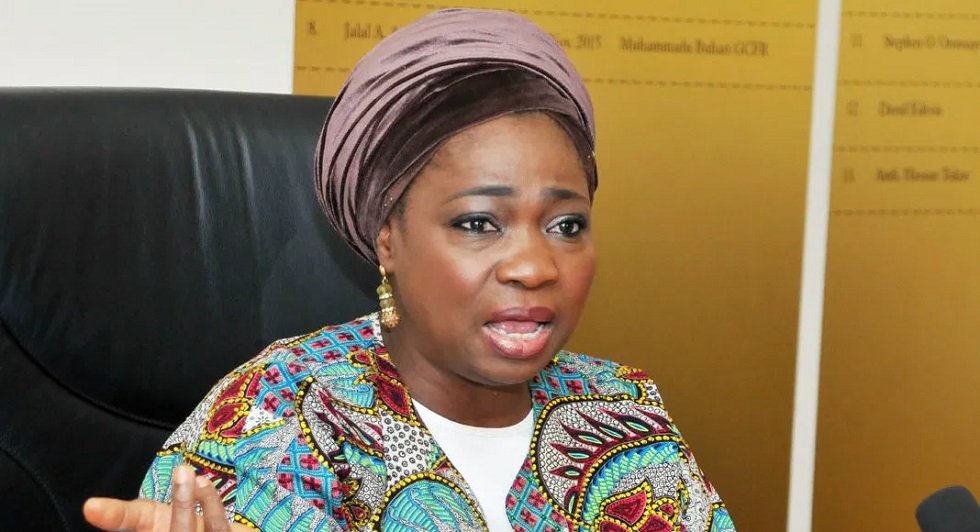
Chairman/CEO of Nigerians in Diaspora Commission Statement
The statement, which was released two hours ago by Abdur-Rahman Balogun, Head Media & Public/Relations, on behalf of the Hon. Abike Dabiri-Erewa, Chairman/CEO of Nigerians in Diaspora Commission (NIDCOM), addressed a few of the details surrounding the students’ trip to Croatia. She noted that the Nigerian Mission in Hungary has been involved in securing their return to Nigeria. Recall that the Chairman had disputed portions of the students' account as reported by The Guardian after that article appeared in The Cable, a Nigerian portal.
“The Minister of Foreign Affairs is on this matter. It’s not as straightforward as you have reported, but the Minister has personally intervened. We should give an update as the intervention continues,” she revealed in a tweet on Saturday, December 7.
Didn’t Inform Nigerian Table Tennis Federation
According to today's statement, five students went to the Fifth World InterUniversities Championships in Pula to compete in table tennis. She also pointed out that they attended the event without the knowledge of the Nigerian Table Tennis Federation. She confirmed Croatian police reports that two had returned to Nigeria after the competition and that another student had applied for asylum in Croatia.
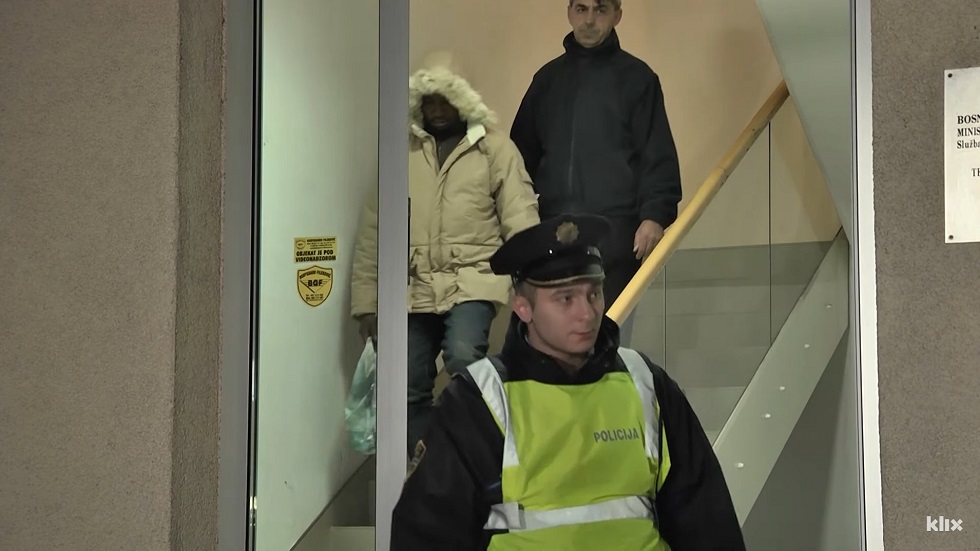
Must use Return Tickets Not Seek Asylum
She emphasized that, as condition of their release, the two students, who are currently being held in Bosnia, must use their return flight tickets from Zagreb and cannot seek asylum in Croatia. While she acknowledged that the Croatian police had denied the students’ allegations, she also noted that Mr. Geoffrey Onyeama, the Hon. Minister of Foreign Affairs of Nigeria, has demanded a full investigation into the incident. She noted that the students are expected to arrive in Croatia anytime from today December 13, 2019.
The statement, which is printed in full below, can be found here.
The Chairman/CEO, Nigerians in Diaspora Commission, (NIDCOM) Hon. Abike Dabiri-Erewa has assured that the two Nigerians in Bosnia Camps are hale and hearty and are expected to return to Croatia anytime from today Friday Dec. 13, 2019 preparatory to come back to Nigeria.
This was sequel to series of diplomatic interventions from the Nigerian Mission in Hungary and Mr. Geoffrey Onyema, Hon. Minister of Foreign Affairs, who directed for full investigations to be carried out.
It will be recalled that two students of the Federal University of Technology, Owerri (FUTO), Abia Alexandro Uchenna and Eboh Kenneth Chinedu, who attended an international table tennis competition in Croatia, ended up in a Bosnian refugee camp.
She said arrangements have been concluded to send the two Nigerians back to Croatia anytime from today, Friday December 13, 2019, adding that the Nigerian Mission in Hungary has taken steps to ensure that the matter is resolved, and the welfare of the two Nigerians protected.
She said that five of them went for the table tennis event without the knowledge of the Nigerian Table Tennis Federation, two returned over two weeks ago, three of them stayed back while one already applied for asylum.
Although the Croatia Authorities through our Ambassador in Budapest denied the allegation involving maltreatment by the Croatian Police, the Hon. Minister of Foreign Affairs, Mr. Geoffrey Onyeama has demanded full investigation into the matter.
She said the conditions attached to their release include usage of their return tickets from Zagreb, Croatia back to Nigeria and must not seek Asylum in Croatia, just as one of them did already.
Dabiri-Erewa appealed to Nigerians to always inform relevant authorities whenever they go on such trips outside the country and be of good behaviour.
According to a report, Abia Alexandro Uchenna, Eboh Kenneth Chinedu, and three other students, arrived in Zagreb, capital of Croatia, on November 12, for the fifth world inter-university championships held in the country.
They were allegedly arrested while taking a walk around the country’s capital on November 18 as they couldn’t produce relevant documents to the police.
The police officers were reported to have transferred the students to the country’s Bosnia-Herzegovina border, where Croatian authorities had gathered a group of illegal migrants attempting to cross into the country.
Signed,
Abdur-Rahman Balogun
Head Media & Public/Relations
Follow our Politics page for updates regarding this story and the migrant crisis in Croatia.
Zagreb Suburb Dubrava Building 42.9 Million HRK Indoor Pool
The Zagreb suburb of Dubrava will be getting a new indoor pool and construction is set to begin in 2020. Here is what the massive complex valued at HRK 42.9m (5.77 Million EUR) will look like.
“We are compensating for the lack of natural light and ventilation of the building by dividing it into three pavilions, which are created by introducing two atriums, where trees will be planted,” the Dubrava pool architects explained to Petra Balija/Večernji List on December 11, 2019.
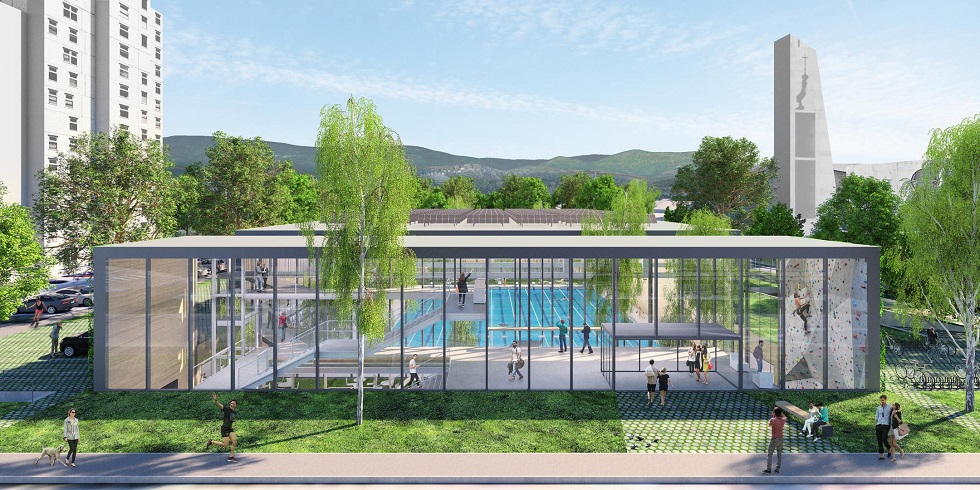
Zagreb Based Radionica Arhitekture Submits Winning Proposal
The pool complex will be nestled between two tall buildings. On one side there will be a 12-story residential skyscraper, and on the other a church with a bell tower that pierces the sky. The location of the future swimming pool in Dubrava, at the corner of Aleja Blaž Jurišića and Križni put ulica, helped dictate the appearance of the building. It was designed by the Radionica arhitekture (Architecture Workshop) team headed by renowned architect Goran Rako. Thirty-three proposals were received in less than two months; the duration of the competition announced by the City of Zagreb. The second prize went to the BIRO Architectural Office and the third to Hrvoje Njirić, Marko Gusić and Irma Šmuc. Construction is expected begin next year, according to reports from the city. The time of year for laying the foundation will be determined in subsequent planning meetings now that the winning proposal has been selected, officials from the Gornja Dubrava district added.
Dubrava Pool Complex Will Have Three Pavilions
Considering that it will be surrounded by taller buildings, the pool building should be as close to the ground as possible, the Radionica arhitekture team thought. Therefore, they designed a low elevation building which will be nestled among taller structures. They will erect "dams", or walls without openings facing east and west, to prevent neighbors from looking in at bathers in the swimming pools.
The Radionica arhitekture team included a "double" cafe on the ground floor of the building, where guests can enter in shoes from the lobby, and bathers can enter through the atrium barefoot or with flip-flops.
“We compensate for the lack of natural light and ventilation within the building by dividing it into three pavilions, which are created by introducing two atriums, where trees will be planted,” the architects point out.
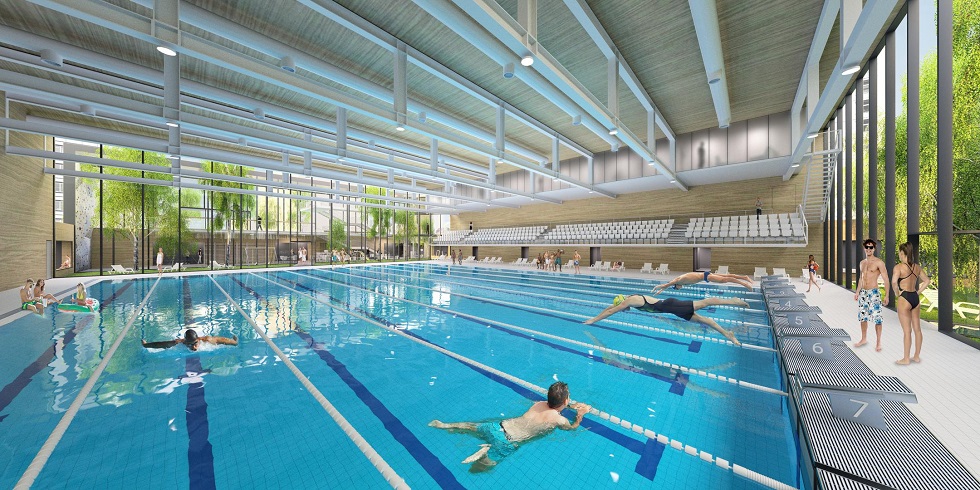
Pool and Locker Room on Subterranean Level
They also wanted to place the pool and locker room on the same floor. Since there wasn’t any space on the ground floor, they solved the problem by lowering both to the subterranean level. In addition to a large sports and recreation pool and a smaller educational and rehabilitation pool, the complex will house a sauna, ballet and choreography hall, 250-person capacity theater, fitness center, breastfeeding area and children’s changing room.
Energy Efficient Design and Water Reclamation System
Putting part of the building underground will enhance energy independence and efficiency, so that building warms up more slowly during summer months and cools down more slowly in winter. In addition, they will install photovoltaic panels, underfloor heating, and a ceiling cooling system. High-efficiency LED lighting will be controlled automatically by the amount of available daylight. Rainwater will be collected from the roof. The complex will also recycle wastewater from showers, washbasins and mechanical structures and use it for flushing toilets and maintaining external surfaces. The estimated cost of the project is 42.9 million HRK (5.77 Million EUR), excluding VAT. This investment will add value and a fresh perspective to the neighborhood, says Damir Oniško, the mayor of the district.
For more information on upcoming architecture competitions and building projects in Croatia, follow our Lifestyle page here.
Bosnia Returning Nigerian Students to Their Homeland
Two Nigerian students, Abia Uchenna Alexandro and Eboh Kenneth Chinedu, accused the Croatian police of chasing them into Bosnia. And now the country's authorities will be returning them to their homeland. As Bosnian Minister of Security Dragan Mektić explained to N1 Bosnia, the two students will be returned to Nigeria because that is what they want.
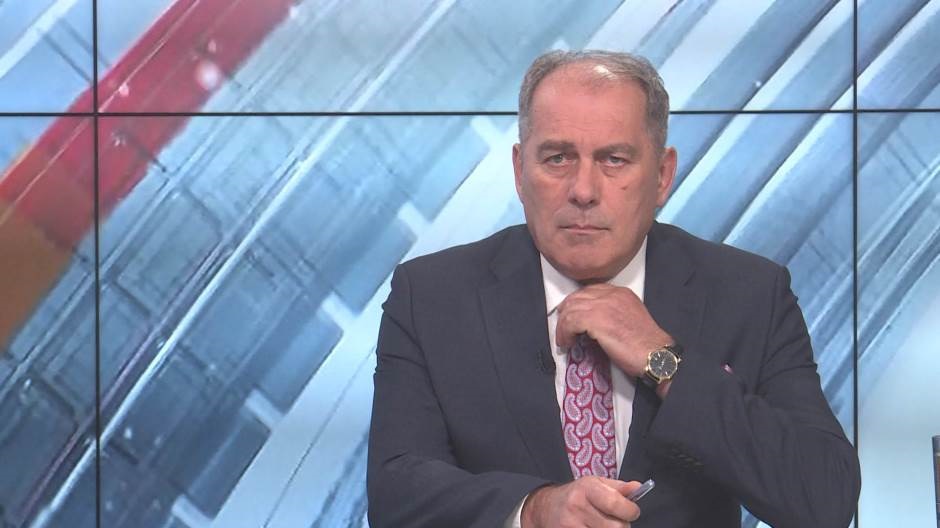
Bosnia Official Claims Students Afraid of Returning to Croatia
"They have agreed to enter the so-called AVR voluntary repatriation program. With their consent, we can return them to their country of origin without subjecting them to additional procedures, readmissions, etc.," Mektić noted.
The minister also explained that the possibility of readmission (i.e. return to the country where the immigrants were staying before entering Bosnia) was not considered.
"They expressed a great fear of returning to Croatia and worried that they would be further harassed there. They were simply afraid for their own lives," Mektić claimed. He added that the two Nigerian students chose not to seek asylum in Bosnia.
Croatian Police and Hostel Manager Deny Students’ Account
Recall that the Nigerian students, who came to Croatia without rackets to play table tennis for a sports competition in Pula, claimed that the Croatian police abducted them in Zagreb on November 17 or 18. According to their uncorroborated account, the Croatian police transferred them to the green border of Bosnia and then expelled them there under threat of violence.
However, the police claim that the Nigerian students “officially checked out of the HI Youth Hostel on November 18, paid their expenses, took their travel documents and possessions, and left for an unknown destination."
The police also noted that another student (in the group of five) tried to enter Slovenia twice and applied for asylum in Croatia on November 27.
The hostel manager confirmed the police account and disputed the students’ claimed check-in and check-out dates. He also disputed the students’ claims that an unidentified “friend” retrieved the students’ passports from the hostel after their alleged disappearance.
Abike Dabiri-Erewa, Chairperson of Nigerians In Diaspora Commission (NIDCOM), also responded to the students’ claims on Saturday, after their story, which originally appeared in Žurnal, was picked up by The Guardian and then The Cable in Nigeria.
“It’s not as straightforward as you have reported, but the Minister (of Foreign Affairs) has personally intervened,” she wrote.
Follow our Politics page for updates on the migrant crisis in Croatia.
Nigerian Students in Bosnia: We won't go to Croatia without UN Escorts!
According to yesterday’s interview for a Bosnian portal, the Nigerian students say they want to go home to Nigeria immediately. If the Bosnian authorities intend to transfer them back to Croatia, they will only agree to go if they are accompanied by United Nations escorts.
Azra Omerović, of the Bosnian portal Žurnal, caught up with the students in East Sarajevo on December 10, 2019.
Original Žurnal Story Went Viral
On December 3, Žurnal published the story of two Nigerian students, Abia Uchenna Alexandro and Eboh Kenneth Chinedu, who allege that Croatian police illegally transferred them to Bosnia and Herzegovina. That story was picked up by several international publications including The Guardian and The Cable, a Nigerian portal. In the meantime, the students were transferred from Velika Kladuša to the Immigration Center in East Sarajevo, after being detained for questioning in Bihać.
The Croatian Ministry of Interior has dismissed allegations by the Nigerian students that they had been illegally transferred to Bosnia by the Croatian police.
Youth Hostel Manager Denies Students’ Account
Branimir Markač, the manager of HI Youth Hostel, the Zagreb hostel where the students stayed, has also disputed the students’ arrival and departure dates. He also denies that the students disappeared on the evening of November 17. He dismisses the students’ claims that an unidentified “friend” later came to pick up their passports, which they claim remained at his hostel after the students were allegedly “kidnapped” by Croatian police. The fact that the students could not remember the name of their hostel further muddies the narrative. There is unconfirmed speculation that the unidentified “friend” might be the other student in their group, who tried to enter Slovenia twice, applied for asylum in Croatia and is currently being housed in Zagreb.
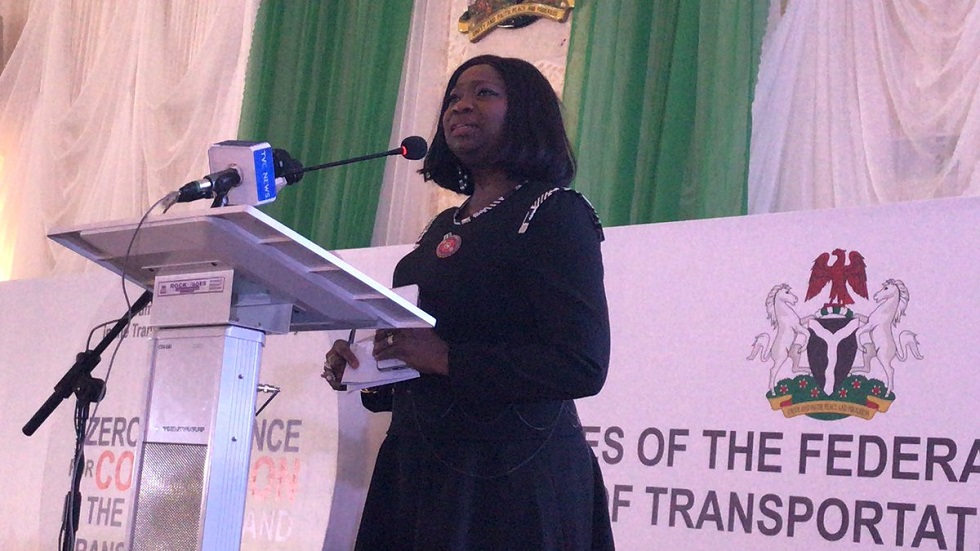
Nigerian Minister of Foreign Affairs Intervened
Abike Dabiri-Erewa, Chairperson of Nigerians In Diaspora Commission (NIDCOM), responded to the students’ claims on Saturday, after their account was picked up by The Cable in Nigeria.
“The Minister of Foreign Affairs is on this matter. It’s not as straightforward as you have reported, but the Minister has personally intervened. We should give an update as the intervention continues,” she wrote.
In their most recent interview with Žurnal, students say they cannot believe what is happening to them and have responded to allegations by the Croatian media and police.
We are Telling the Truth!
“We are scared, we were telling the truth about what the Croatian police did to us. They have accused us of lying because we want asylum in Croatia. We were legal in Croatia, and if we had wanted to seek asylum, we could have applied for it because we had visas,” Kenneth Chinedu insists.
The two Nigerian students are currently being housed in East Sarajevo, at the Center for Foreign Affairs of Bosnia. They say that they have been in custody the entire time.
Currently in Custody in East Sarajevo
“The police questioned us. We told them what happened, and we've been in custody here ever since. We are not allowed to go outside and we're not doing well at all. We need help, have someone help us. Send us home immediately or allow us to be escorted back to Croatia with UN representatives. We will not go to Croatia without UN representatives, maintains Alexandro.
Students Demand UN Escorts for Croatia
“If they want to send us to Croatia, we must be accompanied by the UN. They (the Croatian police) denied everything we said they did to us. We need someone to accompany us every moment and to keep track of what's happening. We are terrified of returning to Croatia after everything that they have done to us. We told the truth and stand by our story!” Alexandro reiterates.
Nigerian Official: There is ‘Back Story’
The Nigerian students are asking the Bosnian authorities to resolve their situation as quickly as possible because they did not enter Bosnia and Herzegovina illegally. However, the details of their transfer to Bosnia remain in dispute, and top Nigerian government official Abike Dabiri-Erewa confirmed that there is a “back story”.
“But whatever the circumstances, the most important thing is to get them back,” she emphasized in Saturday’s tweet.
Follow our Politics page to keep updated on this story and the migrant crisis in Croatia.
Flu Season Begins in Croatia: Quarter of Patients Have Severe Complications
The flu season in Croatia began unusually early this year and based upon the number of patients the epidemic is currently in an upward trajectory. Laboratory tests have confirmed 270 cases of Type A H1N1, a pandemic type which was called "swine" flu in 2009, when the virus was first isolated.
Vladimir Draženović, a virologist at the National Center for Influenza at the Croatian Institute of Public Health, reported that several cases with multiple complications have already appeared, according to Ivana Krnić/Jutarnji List on December 9, 2019.
Actual Number of Flu Cases Closer to 3000
- Considering that there are already 270 reported cases, we can safely assume that the actual number of those affected is closer to three thousand. Patients have experienced severe complications. We are getting calls from other European countries and colleagues are asking us what is happening in Croatia - says virologist Draženović.
He added that as many as ten percent of the patients have developed pneumonia. Adding encephalitis and myocarditis to the list means that number of flu patients experiencing severe complications is closer to twenty-five percent. Also, according to Draženović, it is unusual that about a dozen newborns have fallen ill.
Only Seeing H1N1 (Swine Flu) in Croatia
- We are getting inquiries from Europe since we only are only seeing the H1N1 type, which is also unusual because instances of all the other viruses are being reported outside the country. This flu virus, currently the only one in Croatia, has created major problems, from serious complications for many patients to fatalities - says Vladimir Draženović.
- We encountered one patient who was vaccinated and still got the flu and experienced inflammation of the brain sheath. However, this patient was vaccinated only three days earlier, so the vaccine has not yet started to work - says Draženović, adding that it takes about two weeks for the vaccine to take effect.
Get Vaccinated!
It is worth pointing out that the flu season has started to appear earlier and last longer.
- Until recently, this was the situation in January, but obviously trends are changing - says Draženović, who still recommends getting vaccinated.
This year, the vaccine was dispensed in record time, so besides 360,000 doses, another 30,000 have ordered to be distributed across the country. Since these vaccines are intended for at-risk groups, others can order the vaccine through a pharmacy, take it to their doctor, and get vaccinated there.
Follow our Lifestyle page for updates on the flu season in Croatia.
Croatia MUP and Nigerian Students: Questions Emerge in Alleged Expulsion
Allegations of the abduction and forced expulsion of two Nigerian students to Bosnia by the Croatia police (MUP) has received wide attention in the Croatian media since the Bosnian portal Žurnal broke the story on December 3. More details have emerged, which have led to even more questions, and credibility issues are muddying the narrative.
After yesterday’s official statement from MUP regarding the alleged incident, additional details are emerging, some of which may contradict MUP claims. While the story is being covered extensively in Croatian media, most of the basic questions about this alleged incident haven’t even been addressed.
There are possible credibility issues with a member of the Nigerian group and proven credibility issues with MUP. No witnesses have come forward to corroborate the Nigerian students’ allegations. One member of their group claimed asylum in Croatia on November 27, which may help support the MUP claim that people from third countries are using sports competitions to enter the EU.
However, several world news organizations have disproven MUP’s repeated denials of an aggressive pushback policy toward illegal migrants. Here’s what we still don’t know.
What was the groups’ actual flight itinerary?
According to MUP, the group of five Nigerians, one leader and four students, arrived in Croatia on November 12. The leader and one student departed Croatia via the Zagreb airport on November 17. The students claim that their return flight departed on November 18, which meant that they had arrived on the same flight with the others but wouldn’t be returning to Nigeria on the same flight.
What Zagreb hostel did the students check into?
MUP has not provided the name of the hostel and the students claim that they don’t remember the name, as they had just checked in, before setting off on a stroll through the city.
What date did the students check into that unidentified Zagreb hostel?
MUP claims they checked in on November 16, rather than November 17, as the students claim. Alberto Tanghetti, the organizer of the 5th World InterUniversities Championships in Pula supports the students’ claim and indicated that the students left Pula for Zagreb on November 17 to make their November 18 flight.
Are there any witnesses to the students’ alleged abduction by Croatian police on the Zagreb tram?
The sight of police removing the students from a tram in a large busy city for no apparent reason (they weren’t disturbing the peace) would have produced witnesses. So far no one has come forward.
Who sent the students their passports?
In yesterday’s statement, MUP claimed that the students checked out of their Zagreb hostel on November 18 and took their passports and belongings with them. However, sources now confirm that the students didn’t have their passports with them when they entered Bosnia. An unidentified friend from the competition sent the students’ passports from the unidentified Zagreb hostel to Bosnia. The students received their passports on November 25, nine days after their alleged abduction and expulsion from Croatia.
Where is the students’ luggage?
If the students weren’t allowed to return to the unidentified Zagreb hostel, the hostel would have had their luggage as well as their passports. They would have packed for a five-day trip. Where is their luggage now?
Why would the Croatian police expel the students to Bosnia, when it would have been much easier, and legal, to allow them to catch their return flights to Nigeria?
It would have been very easy for the Croatian police to physically go with the students to the unidentified Zagreb hostel and confirm they were registered there. In addition, by law, every traveler visiting Croatia must furnish their passports to the front desk (or host) of their accommodations upon arrival, as part of the registration process. That information is reported to MUP, so they should have been able to confirm where the students were staying. Why would the Zagreb police detain the students for hours, for no apparent reason, and allegedly send them in a van to Bosnia? Furthermore, in an interview for Index, Željko Cvrtila, an experienced criminologist, emphasized that the Croatian police could have only legally deported them back to Nigeria, as they had valid visas for their stay in Croatia.
If MUP has no record or evidence that the students crossed the Bosnian border, what does that say about the effectiveness of the MUP effort to control the border?
If MUP has no record of the students’ whereabouts and was not able to intersect the students’ illegal and forced expulsion into Bosnia, it would seem to suggest that Croatia still lacks effective tools, surveillance and manpower to monitor and control illegal movement across the border.
Are there any witnesses who can corroborate the students’ arrival and length of stay in Bosnia?
According to the students, they were abducted by Zagreb police on November 17 and taken in a van to the Bosnian border with a group of illegal migrants. That also means that they have allegedly been in Bosnia for 2 ½ weeks.
Is there additional information on the fourth student who sought asylum in Croatia?
According to MUP, the group leader and one of the four students returned to Nigeria on November 17. Another remained in Croatia and tried to enter Slovenia twice, but was denied entry because he did not have a Schengen passport. MUP claims that he reported his passport lost on November 18 and refused an alleged offer from the MUP central station in Zagreb to contact the Nigerian embassy on his behalf. On November 27, the student returned and filed a claim for asylum and is currently being housed in an asylum center in Zagreb.
Did the students perform competitively at the 5th World InterUniversities Championships?
Zoran Ničeno, Director of Border Security, claims in an interview with Dnevnik Nove TV that they had confirmed with organizers that the students fared very poorly at the 5th World InterUniversities Championships and lost every match. He then implied that they may not have been professionally trained for the sport and were simply using the competition as a way of entering the EU. While varied resources and levels of training can produce performance gaps among contestants in international competitions, videos of the students at the event might reveal their proficiency in the sport they flew to Croatia to compete in.
What about MUP’s claims that the students may have been involved with illegal smugglers?
In the same interview, Ničeno claimed that they have information that the students may have been involved with illegal smugglers. What evidence do they have to support that claim?
Did Bosnian officials offer to help the students return to Nigeria?
Ničeno also claimed that Bosnian officials offered to help the students return home to Nigeria, but they allegedly refused and expressed a desire to return to Croatia and apply for asylum. Did this help offer include buying them one-way tickets home? Bosnian official have not confirmed Ničeno's claims.
Follow our Politics page here to stay updated on this story, MUP activities, and the migrant crisis in Croatia.

